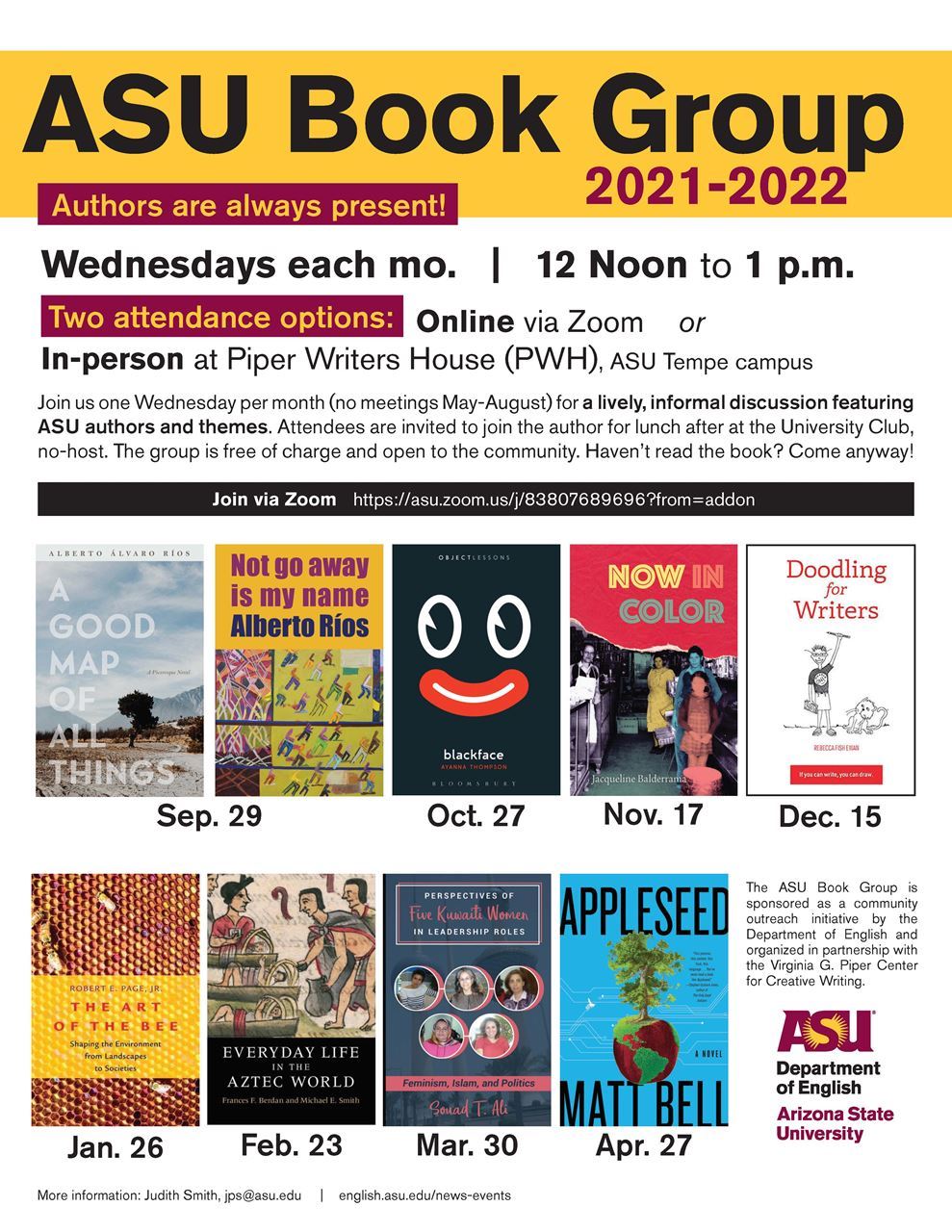
Zoom attendance
The last four meetings of the ASU Book Group are Zoom only and your are requested to register for each meeting you would like to attend. As usual the author is always present.
Note: The January and February readings have been switched from what is shown in the graphic above.
Jan 26 - "Everyday Life in the Aztec World," co-authored by archaeologist Michael Smith, professor, School of Human Evolution and Social Change.
Incredibly vivid and detailed, the book takes readers on a tour of one of Mesoamerica’s greatest civilizations through the daily lives of six people – the emperor, a priest, a featherworker, a merchant, a farmer and a slave – and four events – the birth of a child, a market day, a day in court and a battle.
The book is like a trip back through time with two expert guides. Interspersed throughout the chapters are fictional vignettes like the haggling at the market, a frantic novice priest who finds himself short of human sacrifices on the eve of an important ceremony, a slave who has been slacking off weaving and learns her owners are considering selling her to the priests, and an ambitious farmer who may have bitten off more than he can chew.
Register in advance for this meeting
Feb. 23 - "The Art of the Bee: Shaping the Environment from Landscapes to Societies," by Emeritus Provost Robert E. Page Jr.
The impact of bees on our world is immeasurable. Bees are responsible for the evolution of the vast array of brightly colored flowers and for engineering the niches of multitudes of plants, animals, and microbes. They've painted our landscapes with flowers through their pollination activities, and they have evolved the most complex societies to aid their exploitation of the environment.
The parallels between human and insect societies have been explored by countless sociobiologists. Traditional texts present stratified layers of knowledge where the reader excavates levels of biological organization, each building on the last. In this book, Page delves deep into the evolutionary history and the sociality of bees. He presents fundamental biology-not in layers, but wrapped around interesting themes and concepts, and in ways designed to explore and understand each concept.
Register in advance for this meeting
March 30 - “Perspectives of Five Kuwaiti Women in Leadership Roles: Feminism, Islam, and Politics,” by ASU Professor and Founding Chair of the Council for Arabic and Islamic Studies Souad T. Ali.
In 2005, Kuwait, a country that is more than 90% Muslim, passed laws granting women both the right to vote and the right to run in elections. In her new book, reveals how these and other advancements have affected them on an individual and societal level. Ali was inspired to write “Perspectives” during her 2009–2010 Faculty Fulbright Fellowship at the American University of Kuwait.
Register in advance for this meeting
April 27 – “Appleseed,” by Matt Bell, associate professor of creative writing in the Department of English.
Opening in 18th century Ohio, “Appleseed” begins with the story of two brothers who travel into the wooded frontier, planting apple orchards from which they plan to profit in the years to come. As they remake the wilderness in their own image, planning for a future of settlement and civilization, the long-held bonds and secrets between the two will be tested, fractured and broken — and possibly healed.
The story pivots to the second half of the 21st century, when climate change has ravaged the Earth. Having invested early in genetic engineering and food science, one company now owns all the world’s resources. But a growing resistance is working to redistribute both land and power — and in a pivotal moment for the future of humanity, one of the company’s original founders will return to headquarters, intending to destroy what he helped build.
A thousand years in the future, North America is covered by a massive sheet of ice. One lonely sentient being inhabits a tech station on top of the glacier — and in a daring and seemingly impossible quest, sets out to follow a homing beacon across the continent in the hopes of discovering the last remnant of civilization.
Register in advance for this meeting